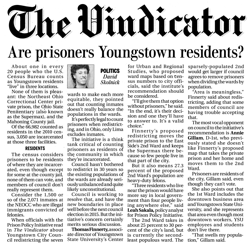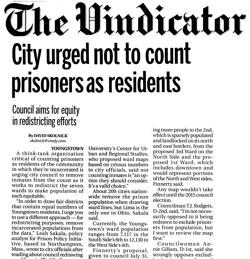A column in The Vindicator shows how prison gerrymandering could undermine local democracy in a Ohio city.
by Leah Sakala,
August 16, 2013
 Check out David Skolnick’s must-read column in today’s issue of The Vindicator about how the Youngstown, Ohio city council can avoid prison gerrymandering.
Check out David Skolnick’s must-read column in today’s issue of The Vindicator about how the Youngstown, Ohio city council can avoid prison gerrymandering.
As he explains:
The census considers prisoners to be residents of where they are incarcerated, even though except for some at the county jail, none of them can vote, and members of council don’t really represent them…
When officials with the Prison Policy Initiative read in The Vindicator about Youngstown City Council redistricting the seven wards to make each more equitable, they pointed out that counting inmates doesn’t really balance the populations in the wards.
Mr. Skolnick says that our concerns “merits serious discussion.” But will the Youngstown city council heed our advice and join the 220+ other local governments that refuse to let the Census Bureau’s prison count skew local democracy? We’ll see.
To draw new wards that are fair and equal the city council must exclude the prison counts from the redistricting data.
by Leah Sakala,
August 13, 2013

As The Vindicator recently reported, the city council of Youngstown, Ohio is working on redrawing the city ward boundaries for the first time in 30 years. Youngstown voters overwhelmingly approved a ballot measure to require the the seven city wards to be redrawn to comply with the constitutional guarantee of “one person, one vote.” But in order to draw fair and equal wards, the city council must take one more simple step: exclude the state and federal prison counts from the redistricting data.
The problem is that the 2010 Census counted 66,982 people in Youngstown, but more than 3,000 of those people are behind bars in the prisons or jail that are located within city limits. If the city councilors decide to draw new wards based on the data as-is, they could end up drawing a “prison gerrymandered” district where more than a quarter of the “population” is made up of non-voting incarcerated people who aren’t even local residents.
As I pointed out in my letter to the editor published on Sunday in The Vindicator, when state or local districts are based on unadjusted Census Bureau data, people who live near big prisons get an unfair political boost and everyone else’s votes are diluted.
Fortunately, after we reached out to city officials to give them a heads up, it looks like they’re paying attention. As the council’s redistricting process moves forward, the councilors should follow the lead of Lima, Ohio and more than 200 other local governments around the country that refuse to let their local democracy be compromised by the Census Bureau’s prison counts.
The Youngstown city council is planning on wrapping up the redistricting process by the end of the year, so stay tuned!
 Check out David Skolnick’s must-read column in today’s issue of The Vindicator about how the Youngstown, Ohio city council can avoid prison gerrymandering.
Check out David Skolnick’s must-read column in today’s issue of The Vindicator about how the Youngstown, Ohio city council can avoid prison gerrymandering.



